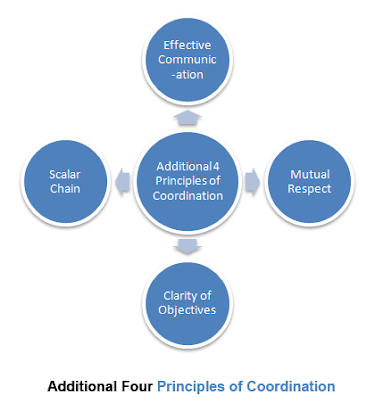Four Principles of Coordination Given By Mary Parker Follett
 Follett's Four Principles of Coordination
Follett's Four Principles of Coordination
Mary Parker Follett gave four main Principles of Coordination. These four principles of co-ordination are called are Follett's Principles of Coordination. These four principles must be followed to make co-ordination effective.
Mary P. Follett's four main principles of coordination are discussed below :-
1. Principle of Early Stage
According to this principle, coordination must start at an early stage in the management process. It must start during the planning stage. This will result in making the best plans and implementing these plans with success. If coordination is started early only then all the management functions will be performed successfully. Thus by initiating proper coordination the organisation will achieve all its objectives easily and quickly.
2. Principle of Continuity
According to this principle, coordination must be a continuous process. It must not be a one-time activity. The process of coordination must begin when the organisation starts, and it must continue until the organisation exists. Coordination must be done continuously during the management process. It must be done during planning, organising, directing and controlling.
3. Principle of Direct Contact
According to this principle, all managers must have a Direct Contact with their subordinates. This will result in good relations between the manager and their subordinates. This is because direct contact helps to avoid misunderstandings, misinterpretations and disputes between managers and subordinates. It enables the managers to coordinate all the different activities of their subordinates effectively and efficiently.
4. Principle of Reciprocal Relations
The decisions and actions of all the people (i.e of all managers and employees) and departments of the organisation are inter-related. So, the decisions and actions of one person or department will affect all other persons and departments in the organisation. Therefore, before taking any decision or action all managers must first find out the effect of that decision or action on other persons and departments in the organisation. This is called the Principle of Reciprocal Relations. Co-ordination will be successful only if this principle is followed properly.
 Additional Principles of Coordination
Additional Principles of Coordination
After Mary Parker Follett, modern management experts have extended her list by adding four additional principles of coordination. These additional or supplementary principles of coordination are explained as follows :-
5. Principle of Effective Communication
Co-ordination will be successful only in the presence of an effective communication. Good communication must be present between all departments, within employees themselves and even between managers and their subordinates. All communication barriers and gaps must be avoided and fixed. Good communication helps to avoid misunderstandings in the organisation. This overall helps in coordination.
6. Principle of Mutual Respect
Coordination will be successful only if there exist a mutual respect throughout the organisation. All managers working at different levels (top, middle or lower) must respect each other. Similarly, all employees must show a friendly attitude and should respect each other during interactions. There must also exist a feeling of brotherly hood among managers and employees. The managers must respect the feelings and emotions of the employees. On the other hand, employees too must understand and acknowledge their bosses. Without mutual respect, coordination may not survive, and it will eventually fail.
7. Principle of Clarity of Objectives
Co-ordination will be successful only if the organisation has set its clear objectives. Everyone in the organisation must know the objectives very clearly. No one must have any doubts about the objectives of the organisation. Clear objectives can be achieved easily and quickly.
8. Principle of Scalar Chain
To read and understand the principle of a scalar chain, please refer to point no.13 of the article titled, "Henri Fayol's 14 Principles of Management".


No Comment Yet
Please Comment